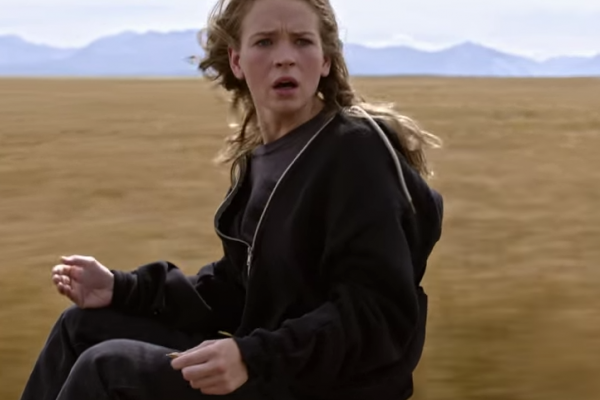It’s both ironic and appropriate that the new Disney film Tomorrowland is being released exactly a week after Mad Max: Fury Road. The new film from director Brad Bird (The Incredibles, The Iron Giant, Mission Impossible: Ghost Protocol) is the polar opposite of post-apocalyptic. It’s a film that’s hugely optimistic about the future, and our ability to fix the world’s problems through good old-fashioned ingenuity. The movie occasionally veers towards overly naïve, and its internal logic doesn’t always work. But despite some problems, it remains a refreshing alternative to a summer movie season that’s otherwise been filled with darker worldviews.
The film starts not with a jump forward, but backward, to the 1967 World’s Fair, where boy genius Frank Walker arrives with a homemade jetpack and hopes of winning an inventing competition. There Frank is befriended by a mysterious girl named Athena (Raffey Cassidy), who takes him to the magical world of Tomorrowland, a colorful futuristic place full of advanced discoveries and retro-space age design.
Cut to today, where bright teenager Casey (Britt Robertson) dreams of space travel and changing the world, despite being surrounded by negatively-minded adults. Athena once again appears, and sneaks Casey a pin that zaps her to Tomorrowland whenever she touches it. But the pin only gives Casey a teaser of the real thing. In order to make her way to the land where imagination and invention reign supreme (and, as it turns out, save that world and her own), Casey has to hunt down the now adult Frank (George Clooney), who’s been exiled from the inventor’s paradise.
Tomorrowland is a very hopeful film, maintaining a brand of gosh-wow optimism that’s endearing when it doesn’t feel silly. Bird’s point is that the future we so often fear from news reports and movies can be changed if we choose not to accept the idea of unavoidable destruction. It’s a noble message (not to mention true), but it sometimes feels like Bird believes that negative future exists only in culture, as if melting ice caps and the threat of nuclear war are just there because of ennui and a culture-wide fascination with The Hunger Games.
The film also suffers from some serious editing issues. Tomorrowland runs just over two hours, but it could easily have been whittled down to a more manageable length. There’s also the surprising amount of violence in the film (mostly bloodless, but still existent) that isn’t necessarily inappropriate, but is likely to spook some of the younger viewers that make up its core audience. The levels of obvious product placement in the movie are likewise kind of troubling — I’d like to believe a better future is possible without the direct involvement of Chevy or Coke.
Still, it’s hard not to appreciate a movie that’s so steadfastly dedicated to positive change, especially when it also appears to claim that great ideas can come from anyone, anywhere and at any age. The film is pretty directly aimed at kids and families, and younger viewers are the ones who will be most able to overlook the film’s obvious flaws and enjoy the bright, creative atmosphere it evokes. It also provides good possible conversations for families that can encourage optimism, creativity, and hope. In the midst of a spate of blockbusters exploring the brokenness of man, it’s nice to have one film that celebrates humanity’s capacity for good, even if that film isn’t perfect.
Tomorrowland is in theaters today. Watch the trailer here.
We here at Sojourners love films, and think they should be enjoyed long after viewing in the theater. So we're introducing some film review discussion questions. Share with your friends and family after going to the theaters, or pull up a chair here and weigh in!
1) What is the difference between the way Casey sees the world and the way the adults in her life see it? Why do you think she sees things differently than the people around her?
2) What are reasons that a person could lose their hope or optimism in the world? How can we keep that from happening in ourselves?
3) In the film, one character suggests that the reason we like post-apocalyptic books, movies, and TV shows is because the future they present doesn’t require us to change the way we live now in order to achieve it. Do you agree or disagree with this statement? Why?
Abby Olcese is the Advertising Assistant for Sojourners.
Got something to say about what you're reading? We value your feedback!
